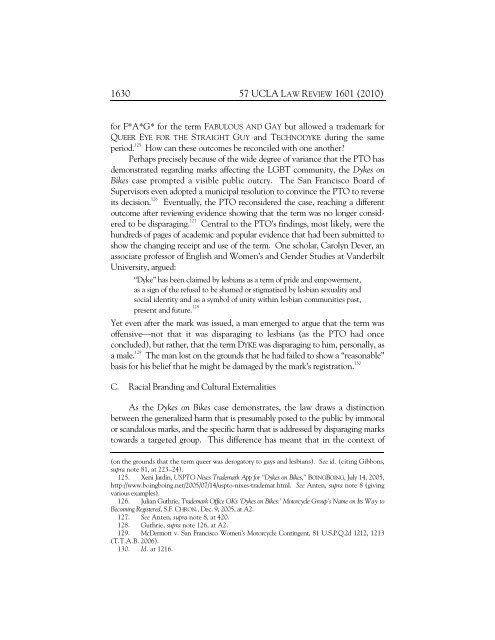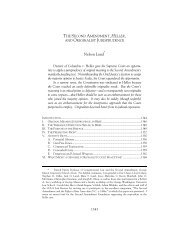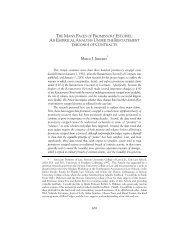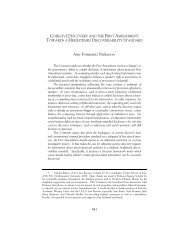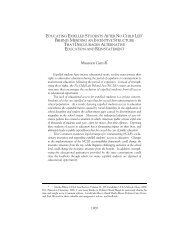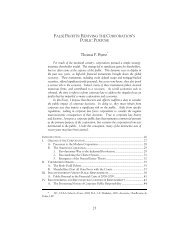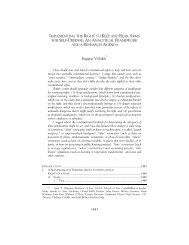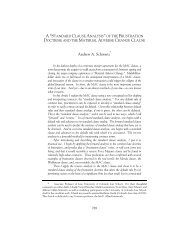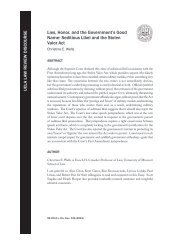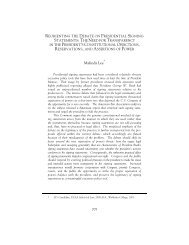Sonia K. Katyal - UCLA Law Review
Sonia K. Katyal - UCLA Law Review
Sonia K. Katyal - UCLA Law Review
You also want an ePaper? Increase the reach of your titles
YUMPU automatically turns print PDFs into web optimized ePapers that Google loves.
1630 57 <strong>UCLA</strong> LAW REVIEW 1601 (2010)<br />
for F*A*G* for the term FABULOUS AND GAY but allowed a trademark for<br />
QUEER EYE FOR THE STRAIGHT GUY and TECHNODYKE during the same<br />
period. 125<br />
How can these outcomes be reconciled with one another?<br />
Perhaps precisely because of the wide degree of variance that the PTO has<br />
demonstrated regarding marks affecting the LGBT community, the Dykes on<br />
Bikes case prompted a visible public outcry. The San Francisco Board of<br />
Supervisors even adopted a municipal resolution to convince the PTO to reverse<br />
its decision. 126<br />
Eventually, the PTO reconsidered the case, reaching a different<br />
outcome after reviewing evidence showing that the term was no longer considered<br />
to be disparaging. 127<br />
Central to the PTO’s findings, most likely, were the<br />
hundreds of pages of academic and popular evidence that had been submitted to<br />
show the changing receipt and use of the term. One scholar, Carolyn Dever, an<br />
associate professor of English and Women’s and Gender Studies at Vanderbilt<br />
University, argued:<br />
“Dyke” has been claimed by lesbians as a term of pride and empowerment,<br />
as a sign of the refusal to be shamed or stigmatized by lesbian sexuality and<br />
social identity and as a symbol of unity within lesbian communities past,<br />
present and future. 128<br />
Yet even after the mark was issued, a man emerged to argue that the term was<br />
offensive—not that it was disparaging to lesbians (as the PTO had once<br />
concluded), but rather, that the term DYKE was disparaging to him, personally, as<br />
a male. 129<br />
The man lost on the grounds that he had failed to show a “reasonable”<br />
basis for his belief that he might be damaged by the mark’s registration. 130<br />
C. Racial Branding and Cultural Externalities<br />
As the Dykes on Bikes case demonstrates, the law draws a distinction<br />
between the generalized harm that is presumably posed to the public by immoral<br />
or scandalous marks, and the specific harm that is addressed by disparaging marks<br />
towards a targeted group. This difference has meant that in the context of<br />
(on the grounds that the term queer was derogatory to gays and lesbians). See id. (citing Gibbons,<br />
supra note 81, at 223–24).<br />
125. Xeni Jardin, USPTO Nixes Trademark App for “Dykes on Bikes,” BOINGBOING, July 14, 2005,<br />
http://www.boingboing.net/2005/07/14/uspto-nixes-trademar.html. See Anten, supra note 8 (giving<br />
various examples).<br />
126. Julian Guthrie, Trademark Office OKs ‘Dykes on Bikes:’ Motorcycle Group’s Name on Its Way to<br />
Becoming Registered, S.F. CHRON., Dec. 9, 2005, at A2.<br />
127. See Anten, supra note 8, at 420.<br />
128. Guthrie, supra note 126, at A2.<br />
129. McDermott v. San Francisco Women’s Motorcycle Contingent, 81 U.S.P.Q.2d 1212, 1213<br />
(T.T.A.B. 2006).<br />
130. Id. at 1216.


